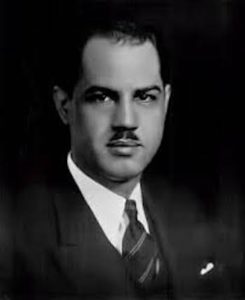
Hubert Delany
*Hubert Delany was born on this date in 1901. He was a Black lawyer, politician, and judge.
From North Carolina, Hubert Thomas Delany was the eighth of ten children born to the Rev. Henry Beard Delany and Nannette James Logan Delany, an educator. His father was born into slavery in St. Mary's, Georgia. Delany was born and raised on the St. Augustine's School (now University) campus in Raleigh, North Carolina. His father was the Vice-Principal, and his mother was a teacher and administrator. Delany was a 1919 graduate of the school.
His sisters, Sadie and Bessie Delany, were activists in their own right who co-authored the bestselling oral history of Having Our Say: The Delany Sisters' First 100 Years. Throughout his early years, Delany believed he would follow in his father's footsteps and become a clergyman within the Episcopal Church. He had been protected from the rigid system of racial segregation that gripped North Carolina in the early twentieth century. After finishing high school, Delany soon followed his older siblings to New York City and attended the City College of New York. He worked his way through undergraduate college, holding a job as a Red Cap railway Pullman porter at New York Penn Station.
During his three years as a law student at NYU Law, Delany was also a teacher in Harlem elementary schools within the New York City Public School system. From 1926 until 1933, Delany served as Assistant U.S. Attorney for the Southern District of New York. By 1934, he was the highest-paid Black federal appointee in the nation and had won 493 of the 500 cases he had argued in the U.S. District Court. He was appointed tax commissioner and later a judge in the Domestic Relations Court. 1929 Delany ran for Congress, representing New York's "old" twenty-first district (today's 2015), but lost the general election.
During the Harlem riot in 1935, Delany and Mayor LaGuardia walked through the streets together to try to quiet things down. After the riot, the mayor appointed Delany and others to the investigatory commission that found that the riot was caused not by communist agitators but by economic deprivation, racial discrimination, and an unresponsive city government. He joined Mintzer, Todarelli, and Kleid in 1933 but left in 1937 to run his law practice. Among his many clients was the classical contralto, Marian Anderson. In 1939, Delany introduced the resolution to the NAACP executive board, leading to her performing instead on the steps of the Lincoln Memorial. On January 1, 1942, he was appointed Justice of the Family Court and served until 1955.
"During his tenure, Judge Delany established himself as a compassionate and humane Justice and a strong and passionate advocate for civil rights. His advice on juvenile issues was" eagerly sought by many individuals and organizations." His many admirers and colleagues cited the understanding, fairness, and delicacy with which he approached his cases; detractors labeled him too" liberal." His critics often interpreted his briefs as"left-wing view" and were used as the"rationale" for not reappointing him in 1955, despite being backed by several bar associations.
During his tenure, Judge Delany established himself as a compassionate and humane Justice and a strong and passionate advocate for civil rights. His advice on juvenile issues was "eagerly sought by many individuals and organizations." His many admirers and colleagues cited the understanding, fairness, and delicacy with which he approached his cases; detractors labeled him too "liberal." His critics often interpreted his briefs as "left-wing views" and used them as the "rationale" for not reappointing him in 1955, despite being backed by several bar associations.
The New York Times claimed that Mayor Robert F. Wagner declined to reappoint Delany because he held communist views; Delany believed he was not reappointed because of his vocal and public stand on civil rights and against second-class citizenship for Black Americans. The NAACP and the National Urban League supported Judge Delany and protested the mayor's decision. On December 28, 1990, Delany died at 89 in Manhattan, where he lived most of his life. He was survived by a wife, Willetta Delany, a daughter, Dr. Madelon Delany Stent, and a son, Dr. Harry Mickey Delany.